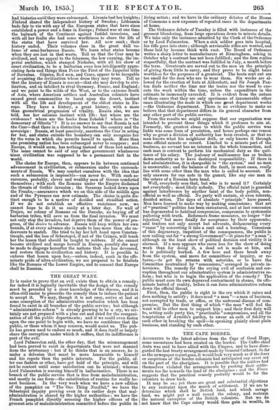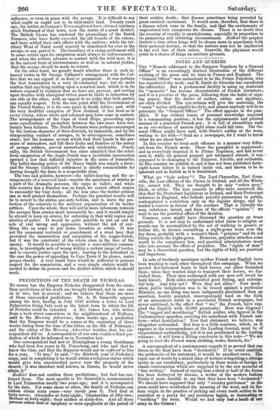THE CAPE BORDER.
Acconnima to the latest advices from the Cape of Good Hope, some uneasiness had been created on the border. The Caffre chief Ante was said to have allied with the Fingoes, and to have disre- garded the last treaty arrangement made by General Cathcart. So far as the newspaper report goes, it would look very much as if the fears or suspicions of the border colonists had anticipated any overt not on the part of the aborigines. It is possible that the settlers had themselves violated the arrangements by pushing their settle- ments too far towards the land of the aborigines ; and the Times suggests that the practical remedy probably would be for the colonists to draw back.
It may be so ; yet there are great and substantial objections to any restraint upon the march of settlement. If we are to determine which shall be British land, and which saver land, we might put a wall round the colony, and restrain the natural enterprise of the British colonists. But we do not know that the Cape colony would thus gain in wealth, in
influence, or even in peace with the savage. It is difficult to say what ought or ought not to be wild-man's land. Twenty years ago, the settler at Graham's Town might not have claimed territory much Eastward of that town, now the centre of a great district. The British Crown has condoned the proceedings of the Dutch Farmers, who have fairly exceeded the old bounds of the colony, and have settled their own affairs with the natives; while the ter- ritory West of Natal could scarcely be abandoned for ever to the savage, or any part of it. The boundary of a rising settlement still to some extent open for emigration must always be indeterminate; and when the settlers advance to contact with the wild men, it is in the natural force of circumstances, as well as in natural justice, that the savage should be made to retreat. On the other hand, we greatly doubt whether there is such in- herent virtue in Sir George Catheart's arrangement with the Caf- fres that we can regard it as final or permanent. It was perhaps the best termination to a very ill-conducted war ; but we must confess that anything resting upon a reserved land, which is in its nature exposed to violation that no force can prevent, and resting upon treaties with aboriginal tribes, must be liable to infraction by one side or the other, with an appeal to no judge that both parties can equally respect. Itels the sore point with the Government of the United States ; it is the sore point in South Africa ; and, with the very doubtful exception of New Zealand, it has been so in every colony, where white and coloured men have come in contact. The arrangements at the Cape of Good Hope, proceeding upon some equalization of protection between the two races, have uni- formly been failures. The Dutch Farmers were perhaps encouraged by the lawless character of their districts, by immunity, and by the
be
exasperating conduct of savages, to over-rigorous, sometimes cruel; but the humane system which tied their hands in the pre- sence of marauders, and left their flocks and families at the mercy of savage robbers, proved unworkable and intolerable. Practi- cally, the British Government has since admitted that the rebel- lions emigration of the Anglo-Dutch was a justifiable insurrection against a law that inflicted injustice in the name of humanity: The ballet-dancing policy of Sir Harry Smith was simply a farce; and Sir George Cathcart's settlement is chiefly commendable for having brought the farce to a respectable close. The two last policies, however—the ballet-dancing and the ar- rangements of a reserved land—require the assistance of armies as a part of the dramatis persons, the corps de ballet; and while this country has a Russian war on hand, we cannot afford armies to encounter the Czar Ante; all the less since the border settlers can so well protect themselves. Perhaps the practical results will be to revert to the status quo ante helium, and to leave the pro- tection of the colonists to the military organization of its border settlers. Upon the whole, they will not be more inhumane towards the savages than armies must necessarily be; and it would simply be absurd to keep up armies for enforoing in that wild region any niceties of police. It would be quite possible to put an end to acts of real wrong and oppression, without the aid of any- thing like an army to put down invaders or rebels. It was not the occasional restraint or punishment of a cruel Boer that provoked the insurrection and emigration of the Anglo-Dutob, but it was the constraint of the whole class in the face of the enemy. It would be possible to appoint a semi-military commis- aim, to investigate acts of wrong within a certain range of border, and to execute justice upon the spot ; leaving to the defendant in the case the power of appealing to Cape Town if he please, under proper checks. A very small force would be sufficient to procure respect for the commission, and a very simple statute would be needed to define its powers and the district within which it should work.



























 Previous page
Previous page